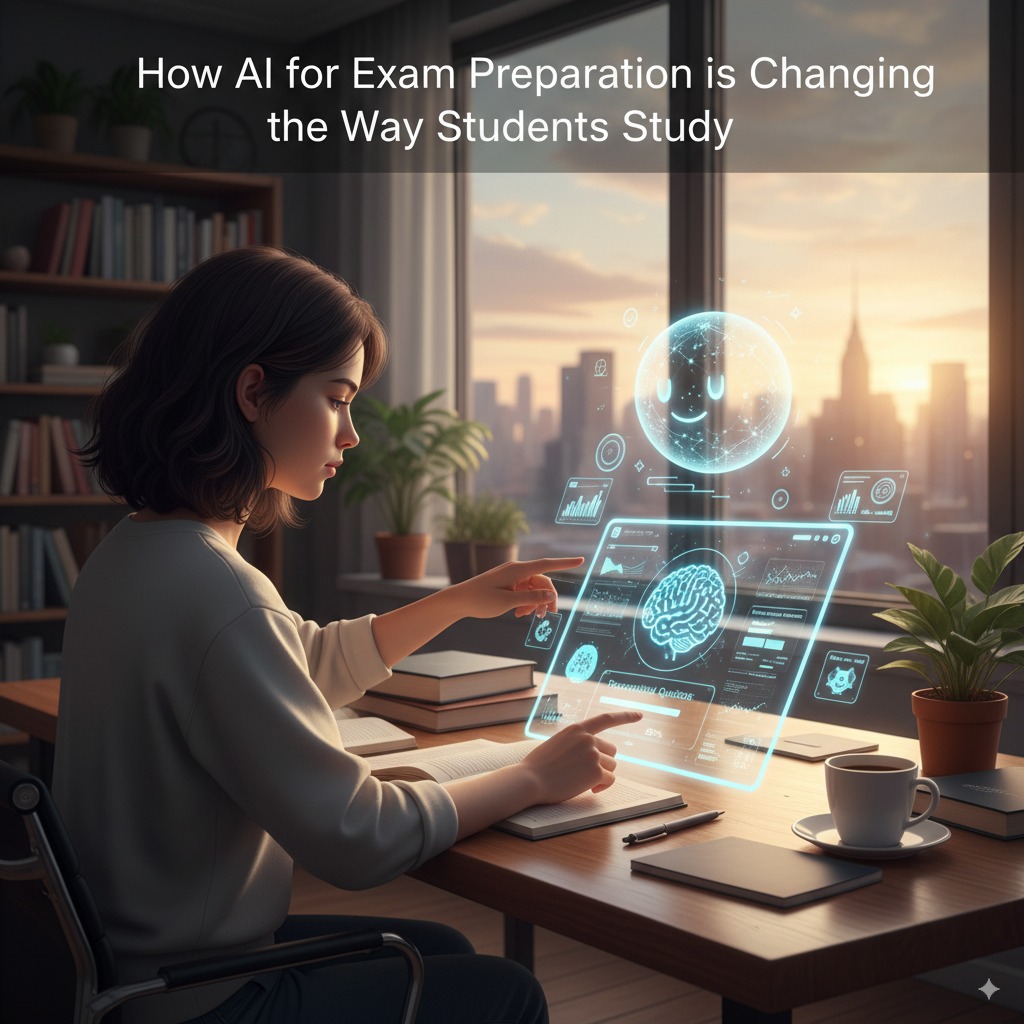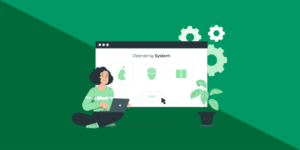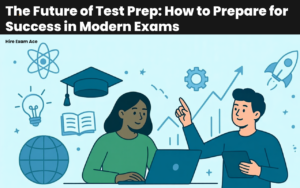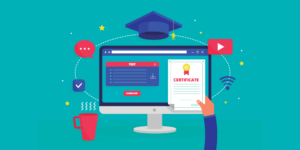How AI for Exam Preparation is Changing the Way Students Study
In the contemporary busy world of learning, students constantly require more effective ways of learning to pass the exams. The preparation of examination has never been founded on modern methods of study, such as textbooks, notes, and group discussions. Despite the fact that these methods have proved to be extremely successful among the students, they require a lot of time, effort, and self-discipline. However, the advent of the AI-based learning applications has enabled learners to now obtain more personalized data-driven learning experiences that may facilitate their learning process.
When using AI-based platforms, exam preparation allows being more effective and personalized, feedback is provided in real-time, progression is monitored, and the needs of each student are addressed more adaptively. In this highly competitive world, where academic performance is also of major determinant of future prospects, learning how to study smarter, but not harder, is a crucial skill. AI is revolutionizing the minds of students by offering new ways of learning, training and ultimately passing exams. This is revolutionizing the future of education and student performance.
What is AI for Exam Preparation?
Exam preparation AI is the application of artificial intelligence technology to help students prepare efficiently to take their exams by using personalized and adaptive study materials. In education, AI uses data, machine learning algorithms, and natural language processing to provide individualized learning assistance to help students grasp difficult ideas and detect learning gaps. It transcends conventional study methods by providing real-time feedback and corrections depending on personal performance.
Key features of AI-based study tools include adaptive learning, where the system adjusts content and difficulty levels based on the student’s learning pace and mastery of subjects. This allows for a customized study plan that targets the student’s weaknesses. Chatbots are another significant feature, providing instant assistance and clarification on any doubts, mimicking a tutor’s support. AI also enables automated grading, allowing for quick feedback on practice tests and assignments, which helps students gauge their understanding without waiting for manual evaluation.
Popular platforms utilizing AI for exam preparation include Duolingo, which uses AI to personalize language learning, and Quizlet, offering AI-powered flashcards for exam review. Other tools like Khan Academy and Socratic by Google provide AI-driven resources and learning activities that adapt to individual students’ needs. These platforms not only improve the quality of study sessions but also make chemistry exam preparation more accessible, interactive, and efficient, helping students stay on track and enhance their performance.
Benefits of AI in Exam Preparation
AI in exam preparation offers a range of benefits that significantly enhance the learning experience for students, making it more efficient, personalized, and accessible. One of the most significant advantages is personalized learning. AI-powered platforms create customized study plans based on a student’s strengths and weaknesses, ensuring that each individual receives the right level of challenge. This targeted approach helps students focus on areas where they need improvement, rather than spending unnecessary time on topics they already understand. By adapting to a student’s learning style and pace, AI ensures a more effective study session that maximizes learning outcomes.
24/7 availability
This is another key benefit. Unlike traditional study environments, which are bound by time and location, AI tools are accessible at any time of the day. This flexibility allows students to practice and review content whenever it suits their schedule, creating opportunities for consistent learning outside of traditional school hours. Whether early in the morning or late at night, students can continue their preparation without interruptions.
Instant Feedback
AI tools also provide instant feedback, which is crucial for improving understanding and retention. As students engage with practice questions or exercises, AI systems can quickly identify mistakes and offer corrections, helping students learn from their errors immediately. This real-time feedback accelerates the learning process, preventing misunderstandings from lingering and fostering better retention of information.
Time Efficiency
This is another significant advantage of AI-based study tools. By focusing only on relevant topics, AI helps students cut down on time spent revising material they’ve already mastered. Instead, it prioritizes content that aligns with the student’s performance, allowing for a more streamlined and effective study session. This tailored approach ensures that every minute spent studying counts.
Reduce Stress
AI can help reduce stress during exam preparation. By offering smart study techniques, such as personalized quizzes, spaced repetition, and interactive learning methods, AI encourages students to approach their studies with greater confidence. It alleviates anxiety by ensuring that students know exactly what to focus on and providing structured learning plans, which promotes a sense of control and accomplishment. As students make steady progress, their confidence grows, contributing to a more positive and less stressful study experience.
How AI Tools Help Students Study Smarter
AI tools have transformed the way students study, allowing them to study smarter and more efficiently by using advanced technologies that adapt to their unique needs and learning styles. One of the key features of AI in exam preparation is adaptive quizzes and practice tests. These quizzes adjust the difficulty level and content based on the student’s performance, ensuring that each question is appropriately challenging. As students answer questions, the AI system analyzes their progress and tailors subsequent quizzes to target areas where they need more practice, helping them focus on their weaknesses and reinforcing their strengths.
AI-powered flashcards and notes are another popular tool that enhances revision. By using spaced repetition algorithms, these tools present key concepts at optimal intervals to improve long-term retention. Students can quickly review important material through digital flashcards, which are personalized to their learning needs. This method not only helps in retaining information but also makes revising faster and more efficient compared to traditional methods, such as manually reviewing notes.
Another powerful way AI helps students study smarter is through predictive analytics. AI tools can analyze a student’s past performance, track their progress, and forecast how well they are likely to perform in future exams. This allows students to identify areas they need to focus on more and gives them a clearer sense of their preparedness. By understanding their potential performance trajectory, students can adjust their study habits and strategies accordingly, giving them a more targeted and proactive approach to exam preparation.
Finally, proctoring and monitoring tools provide students with a comprehensive assessment of their exam readiness. These AI-driven systems monitor students during practice tests to ensure integrity and provide real-time insights into their behavior, such as time management and accuracy. This helps students develop better exam strategies, manage their time effectively during tests, and reduce exam-day anxiety by simulating the actual exam environment.
By leveraging these AI tools, students can study smarter, using personalized, efficient, and predictive methods that enhance their learning experience and exam performance.
Real-Life Applications of AI in Exam Prep
AI is increasingly becoming an integral part of exam preparation, with real-life applications across a variety of standardized tests and learning platforms. One of the most prominent areas where AI is making a difference is in standardized tests like the SAT, GRE, GMAT, HESI, and NCLEX. These exams often require a significant amount of preparation, and AI-driven platforms are now offering personalized study schedules, practice questions, and feedback to help students master the material. For example, platforms like Magoosh and PrepScholar use AI to analyze a student’s performance on practice questions and suggest tailored study materials. This personalized approach helps students focus on their weak areas, ensuring a more efficient and effective study process.
Another notable application of AI is in AI-driven mock tests and simulations. These tools offer realistic practice exams that mimic the format and difficulty of actual tests, helping students familiarize themselves with the test structure and time constraints. AI platforms like Princeton Review and Kaplan offer adaptive mock tests that evolve based on a student’s progress, enabling them to continuously refine their knowledge and test-taking strategies. These simulations help build both content knowledge and test-taking skills, ensuring that students are well-prepared for the real exam.
AI is also being used for voice and visual recognition in interactive learning. Platforms like Socratic and Google Assistant use natural language processing and visual recognition to help students solve problems by simply speaking to or interacting with their devices. For example, students can take a picture of a math problem, and the AI will provide a step-by-step solution. This type of interaction not only makes learning more engaging but also allows students to explore and understand concepts in a more dynamic, hands-on manner.
A powerful case study highlighting the success of AI in exam preparation is seen in the experience of students using platforms like Chegg and Socratic. One group of students preparing for the NCLEX exam utilized AI-driven practice questions and simulations, which allowed them to identify knowledge gaps and reinforce key concepts. As a result, they reported a significant improvement in both their confidence and scores. Another example comes from students using Khan Academy, which uses AI to guide learners through personalized practice problems. These students saw measurable improvements in their test scores after a few weeks of focused, AI-assisted study.
These real-life applications of AI in exam preparation demonstrate the transformative power of technology in enhancing student learning and exam performance. Whether through personalized mock tests, interactive learning tools, or predictive analytics, AI is enabling students to approach exams more efficiently and effectively.
Read More: Ace Your HESI Exit Exam: Tactics for Nursing Scholars
Challenges & Limitations of AI for Exam Preparation
While AI offers significant benefits for take my TOEFL exam for me preparation, there are several challenges and limitations to consider.
Over-Dependence on Technology
One of the main concerns is over-dependence on technology. Students may become too reliant on AI-powered tools, potentially hindering their ability to think critically or develop independent study habits. This reliance can reduce the development of essential cognitive skills that are crucial for problem-solving and analytical thinking.
Lack Of Human Interaction and Motivation
Another limitation is the lack of human interaction and motivation. AI tools can provide instant feedback and personalized content, but they can’t replace the motivation and guidance that human teachers or study groups offer. Without face-to-face engagement, some students may struggle with staying motivated, particularly during long study sessions.
Cost of Premium AI Tools
The cost of premium AI tools is another obstacle, as many advanced platforms require paid subscriptions. Not all students can afford these services, potentially limiting access to high-quality resources.
Privacy And Data Security Concerns
Lastly, privacy and data security concerns remain a challenge. AI tools often collect a vast amount of personal data, and there are potential risks associated with data breaches or misuse. As a result, students need to ensure that their data is protected while using these platforms.
Some students may even consider opting for alternatives, like deciding to pay someone to do my online exam, to bypass these challenges, but using AI tools effectively can offer long-term benefits if used wisely. Balancing AI assistance with traditional study methods is key to overcoming these limitations.
The Future of AI in Student Learning
The future of AI in student learning holds immense potential for transforming education on a global scale. One of the key developments is the growth of AI tutors and study assistants. These virtual tutors will become increasingly sophisticated, offering personalized, real-time assistance and adapting to each student’s learning style. As these tools improve, they will provide 24/7 support, offering tailored lessons, practice exercises, and immediate feedback, enhancing the overall learning experience.
AI’s integration with augmented reality (AR) and virtual reality (VR) will further revolutionize education by creating immersive, hands-on learning environments. These technologies will allow students to engage in simulations and interactive scenarios, bringing abstract concepts to life and enabling experiential learning that would be impossible in a traditional classroom setting. AI-driven AR/VR could make learning more engaging, dynamic, and effective across various subjects.
Another exciting development is the rise of AI-driven predictive career guidance. By analyzing a student’s performance, interests, and skill sets, AI platforms could offer personalized career advice, suggesting potential career paths and the steps needed to achieve them. This could help students make informed decisions about their futures, aligning their academic efforts with career aspirations.
| Platform | Pricing (approx.) | Rating / User Feedback | Key Features |
|---|---|---|---|
| Quizlet | Free basic; Plus |
High user satisfaction; G2 reviews highlight helpfulness in studying (G2) | Millions of flashcard sets, adaptive “Learn” mode, AI-powered tools, gamified study |
| Magoosh | SAT/ACT ~$399/year; TOEFL ~$129 (6 mo) (sat.magoosh.com, toefl.magoosh.com, Test Prep Insight, Wikipedia) | Praised for value, video lessons, score-improvement guarantees (Test Prep Insight, My Engineering Buddy) | Extensive video lessons, practice questions, predictive analytics, expert support |
| Socratic | Free (Google app); some sources claim paid plans (~$99+/mo) but confusing (futurepedia, SaaSworthy, Wikipedia) | Appreciated for solving diverse subjects with step-by-step explanations (La Crème, Apple) | AI photo solver, step-by-step solutions, multi-subject support via camera and OCR |
| PrepScholar | SAT full-year ~$397; premium ~$4,795 live tutoring; GRE ~$398–$848 (History Cooperative, Test Prep Insight) | Known for adaptive prep, score guarantees; some users question quality for price (Miami Herald, Reddit) | Personalized adaptive plans, score guarantees, official practice content, expert tutoring |
Conclusion
In conclusion, AI is transforming how students approach their studies, offering personalized, efficient, and dynamic tools that significantly enhance exam preparation. With features like adaptive quizzes, instant feedback, and 24/7 availability, AI helps students focus on their weaknesses and optimize their study time, making learning more effective. However, it’s important to remember that AI is a tool designed to complement, not replace, hard work and discipline. By embracing AI in a balanced way, students can improve not only their exam performance but also their overall learning experience, setting themselves up for success in both academics and future career endeavors.
FAQs (“People Also Ask”)
1. Can AI really help me prepare better for exams?
Yes, AI can significantly enhance your exam preparation by offering personalized study plans, adaptive quizzes, and instant feedback. AI-powered tools analyze your strengths and weaknesses, tailoring the study content to focus on areas where you need the most improvement. By using these tools, students can experience more engaging and interactive learning methods that improve understanding and retention, leading to better exam results.
2. Is AI-based exam preparation more effective than traditional methods?
AI-based exam preparation is often more effective than traditional methods because it provides a personalized learning experience that adapts to each student’s individual needs. Unlike textbooks or static study guides, AI tools continuously assess your progress and adjust the difficulty of tasks to match your level of understanding. This ensures that you spend less time on topics you already know and more time on areas where you need improvement.
3. What are the best AI tools for exam prep in 2025?
In 2025, some of the best AI tools for exam preparation include Magoosh, Quizlet, Khan Academy, and Chegg. These platforms offer personalized learning plans, practice questions, and detailed performance analytics. For standardized test prep, tools like PrepScholar and Princeton Review use AI to tailor practice tests and provide targeted study recommendations.
4. Is AI exam preparation affordable for students?
While many AI exam preparation tools offer free versions, accessing the full range of features often requires a paid subscription. Premium platforms like Magoosh or PrepScholar can be expensive, especially for students on a tight budget. However, there are also affordable options, such as Khan Academy and Quizlet, which provide free access to AI-driven learning resources.







